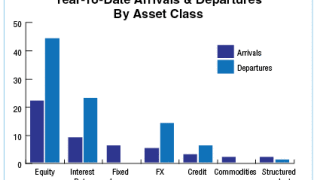Learning Curve
-
Last week investors were feeling nervous about emerging market credit. Fund outflows were increasing and spreads in emerging market sovereigns widening sharply.
-
The launch on June 3, 2013 of the IIFM Interbank Unrestricted Master Investment Wakalah Agreement by the International Islamic Financial Market is another milestone in the development of liquidity management products for Islamic Financial Institutions and another milestone in the project of standardisation in Islamic Finance documentation.
-
Derivative product companies are structured financial entities that act as intermediaries for, or guarantors of, an affiliated entity under interest rate or fx derivatives with a non-affiliated counterparty.
-
Barclays made the most senior hire of the week, appointing ex-Goldman Sachs trader Michael Winkelgrund as head of exchange-traded fund trading. Deutsche Bank, meanwhile, hired Monty Lee as a senior index options trader from Barclays. In Asia Pacific, Nicholas Smith has replaced PJ Andersson as global head of pan-Asian equity derivative and convertible sales at Citigroup, after the latter left the firm last week.
-
This year, regulatory reporting requirements introduced under the Dodd-Frank Act—impacting financial institutions engaged in cross-border derivatives transactions with US counterparts—have brought attention to the management of client data. The U.S. reporting requirements form part of the global effort to reduce systemic risk and improve transparency in the derivatives markets, and in a few short months, Europe will follow suit with similar but not identical rules that necessitate the reporting of listed and OTC derivatives transactions to a trade repository. Notwithstanding some of the technical nuisances in the reporting mandates of various jurisdictions, the increased focus on trade reporting provides some thematic similarities with which institutions should consider when reviewing the impacts and action plans for compliance. Namely, more than ever before, client or counterparty data management is becoming a critical function of the new derivatives markets, increasing the focus on this area well beyond the current client on-boarding function, and Know-Your-Customer processes. In the context of the increased burden of reporting requirements, ineffective management of counterparty data has the potential to disrupt client relationships. To mitigate this, the different functions within an institution—including the front, middle and back office—will have to demonstrate a more integrated approach to client data management in order to support the compliance function, ensure successful and streamlined implementation and in turn, minimise impact on the customer experience.
-
Since its inception, the non-FX/equity OTC derivative market was largely self-regulated. As the market grew from the late 1990s to mid-2005, this model worked well. New dealers were entering the OTC derivative market and competition amongst this group was fierce. However, as the participating dealer base peaked around 2005, so too did conditions of free money and leverage. These conditions helped fuel the financial crisis that would soon follow and completely reshape the OTC derivative and financial markets.
-
The ISDA March 2013 Dodd-Frank Protocol is now open for adherence by market participants that trade swaps subject to the Commodity Future Trading Commission’s jurisdiction.
-
The Commodity Futures Trading Commission, pursuant to the Dodd Frank Act, has implemented rules which require that all swap counterparties report and keep record of certain swap data.
-
This Learning Curve studies the conditions for the effective risk management of counterparty credit risk (CCR) by detailing and comparing capital requirements, identifying inconsistencies in prudential regulations and applying the various capital approaches on some typical portfolio strategies observed within financial institutions.
-
In Dec. 2012 the Securities Association of China opened up the over-the-counter market to securities companies by issuing its Regulations for Over-the-Counter Trading Business of Securities Companies.
-
From 1 April 2013, a new financial regulation framework took effect in the U.K. The Financial Services Authority (FSA) is replaced by the Financial Conduct Authority (FCA) and the Prudential Regulation Authority (PRA), the Bank of England is to have overall responsibility for financial stability and a new Financial Policy Committee (FPC) of the Bank of England is being created. However, the Financial Services Act 2012 does more than just give effect to these regulatory reforms.
-
Since the start of the year the spread between the 5-year EUR swap and 5-year German Government bond has widened from around +47 bps to +51bps, it has however been as low as +30bps and peaked at +61bps. This spread is known as the swap spread.





